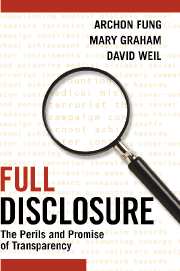Book contents
- Frontmatter
- Dediaction
- Contents
- List of Figures and Tables
- Preface
- 1 Governance by Transparency
- 2 An Unlikely Policy Innovation
- 3 Designing Transparency Policies
- 4 What Makes Transparency Work?
- 5 What Makes Transparency Sustainable?
- 6 International Transparency
- 7 Toward Collaborative Transparency
- 8 Targeted Transparency in the Information Age
- Appendix: EighteenMajor Cases
- Notes
- Bibliography
- Index
7 - Toward Collaborative Transparency
Published online by Cambridge University Press: 27 July 2009
- Frontmatter
- Dediaction
- Contents
- List of Figures and Tables
- Preface
- 1 Governance by Transparency
- 2 An Unlikely Policy Innovation
- 3 Designing Transparency Policies
- 4 What Makes Transparency Work?
- 5 What Makes Transparency Sustainable?
- 6 International Transparency
- 7 Toward Collaborative Transparency
- 8 Targeted Transparency in the Information Age
- Appendix: EighteenMajor Cases
- Notes
- Bibliography
- Index
Summary
The brief but serious SARS pandemic of 2003 showed how crisis can revive a moribund international transparency policy. The response to this new and sometimes fatal disease also provided an intriguing glimpse into the future by suggesting how communication technologies can transform the way transparency systems work.
As noted earlier, emails, cell phone calls, and Internet chatroom messages from health-care workers and villagers in China's Guangdong Province in late 2002 and early 2003 first spread the word that people were falling ill from a mysterious respiratory illness. As the Chinese government continued to deny the existence of such an illness, private electronic trackers of infectious diseases, such as ProMED-mail, picked up the electronic traffic and warned that the outbreak might be caused by a previously unknown virus that attacked the respiratory system.
Officially, the United Nations' World Health Organization (WHO) could not act on this information. Under its rules, which could only be changed by a vote of its 192 member nations, the WHO was supposed to respond only to government alerts. However, spurred by messages from ordinary citizens and private aggregators of data, the WHO continued to press the Chinese government for information. Confronted with de facto public knowledge, the government finally acknowledged the outbreak. In response, the WHO issued a global alert on March 12, 2003, and a travel advisory on March 15.
Information
- Type
- Chapter
- Information
- Full DisclosureThe Perils and Promise of Transparency, pp. 151 - 169Publisher: Cambridge University PressPrint publication year: 2007
- Creative Commons
- This content is Open Access and distributed under the terms of the Creative Commons Attribution licence CC-BY-NC 4.0 https://creativecommons.org/cclicenses/
